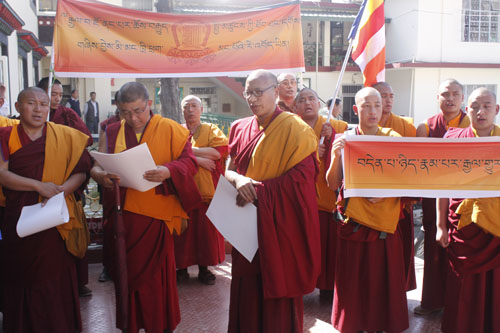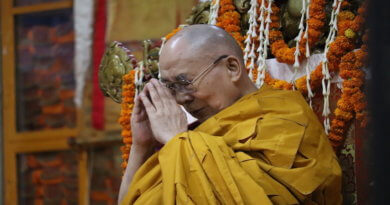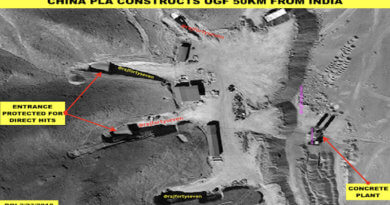Tibetans vote in preliminary polls for new political leader, parliamentarians
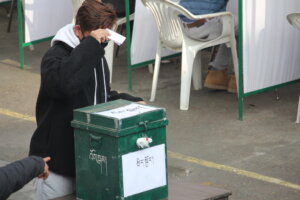
DHARAMSALA, Jan 3: Tibetans across the world cast their vote in the preliminary elections of the Sikyong or political leader of the Tibetan people and members of the 17th Tibetan Parliament in exile today.
Local Tibetans in Dharamsala, the exile residence of the Tibetan spiritual leader His Holiness the Dalai Lama and the seat of the Tibetan government in exile (officially known as the Central Tibetan Administration) braced the winter chills and light drizzle and came to the polling booths to choose their future leaders in masks while maintaining social distancing.
A total of sixteen polling booths, six more than the last cycle has been set up in various places in Dharamsala to facilitate maximum participation from the voters amidst the ongoing COVID-19 pandemic that the world continues to battle.
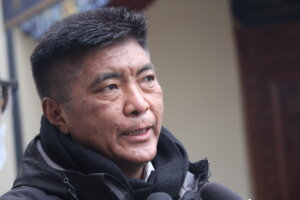 Wangdu Tsering Pesur, the Chief Election Commissioner (CEC) of the Central Tibetan Administration said that Tibetan communities in some states in the US and European countries were the worst affected as COVID-19 imposes a big challenge to successfully hold the election.
Wangdu Tsering Pesur, the Chief Election Commissioner (CEC) of the Central Tibetan Administration said that Tibetan communities in some states in the US and European countries were the worst affected as COVID-19 imposes a big challenge to successfully hold the election.
The CEC however assured that guidelines have been issued regarding it and applauded the regional election bodies for making arrangements in accordance with the election rules of the CTA.
However, he replied in affirmative about the problems being faced to conduct the elections in Nepal.
Earlier reports said authorities in Nepal detained five Tibetans including a journalist as the elections were secretly held.
The two earlier election cycles were also marred with difficulties that Tibetans and rights group say stems from Nepal’s cosying up to China.
A source from Kathmandu confirmed that efforts are on to successfully conduct the elections with some special arrangements for the voters.
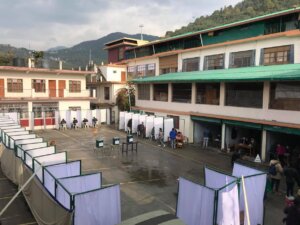
Noticeable absentees at the ballot include the Speaker and the deputy speaker along with the Standing Committee of the Tibetan Parliament-in-exile (TPIE). The Tibetan Supreme Justice Commission (TSJC) withheld their right to vote after declaring the postponement of the 16th TPIE’s September session unlawful.
Additionally, six other Tibetans have had their right to contest and vote barred as well.
He further urged the Tibetans to exercise their suffrage and vote with the common good of the nation in their mind.
Over eighty thousand exiled Tibetans from forty countries across the world have registered to cast their vote in the preliminary elections being held to choose the future Sikyong or political leader of the Tibetan people and members of the 16th Tibetan Parliament-in-exile.
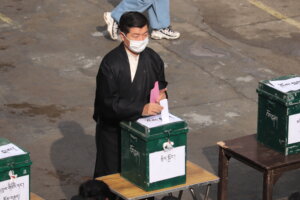 As the Tibetan diaspora takes to the ballot exercising the democratic system bestowed by His Holiness the Dalai Lama and “thereby walk shoulder to shoulder with other democratic countries around the world,” this will send a “strong message to China”, says Dr Lobsang Sangay, the sitting Sikyong of the Tibetan people.
As the Tibetan diaspora takes to the ballot exercising the democratic system bestowed by His Holiness the Dalai Lama and “thereby walk shoulder to shoulder with other democratic countries around the world,” this will send a “strong message to China”, says Dr Lobsang Sangay, the sitting Sikyong of the Tibetan people.
“This is a momentous and historic event. Even though we are in exile and refugees, we are exercising our fundamental right. This sends a message to Beijing that Tibet is under occupation. ” President Sangay said after casting his vote flanked by his cabinet.
“But Tibetans in exile are free and given a chance and opportunity, we prefer democracy over the authoritarian system,” he added.
He further added that China’s repression of Tibetans, implementation of cultural assimilation, environmental destruction, social discrimination and economic marginalization will not deter and change “the pride of Tibetans, the sense of Tibet and Tibetans to be democratic and practice democracy.”
Wishing success to whoever replaces him as the next Sikyong and the 17th Tibetan parliament members, he added that “Their success is our success. So we have nothing but hope and wish them the very best. We hope that they succeed in leading the path and taking the Tibetan freedom movement forward and running the CTA very, very successfully.”
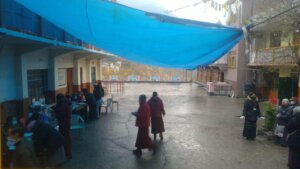
An elderly Tibetan who doesn’t want to be named complained about the difficulty in casting his votes as he says he has to fill not just name but their native or origin, residence and occupation to fill up his vote for parliamentarian. “It’s a little too much trouble for illiterate and old people like me,” he said.
Though senior citizens are allowed to be accompanied to fill up their ballots, the problem remains for the unaccompanied lot.
Sonam, a Tibetan youth called for the need of NOTA option in the Tibetan general election.
“I voted for parliamentarians but really wished we had the NOTA option when it came to my vote for Sikyong,” he said.
NOTA, or “None of the Above”, is the option which enables the voter to officially register a vote of rejection for all candidates who are contesting. If a voter chooses to press NOTA it indicates that the voter has not chosen to vote for any of the party. On 27 September 2013, the Supreme court of India ruled that the right to register a “none of the above vote in elections should apply, while ordering the Election Commission to provide a button for the same in the electronic voting machines.
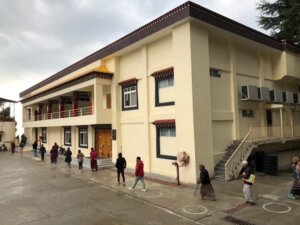
Apart from India, the largest democracy in the world, Indonesia, Greece, Ukraine, Belarus and Spain are some other countries with NOTA options on ballots.
It is only the third time that the Tibetans are directly choosing their leadership since the devolution of political authority by His Holiness the Dalai Lama since 2011.
Those in the run for the top office of the exiled Tibetans include for 2021 Sikyong election include former CTA Kalon Gyari Dolma and Lobsang Nyandak, Kelsang Dorjee Aukatsang (Kaydor), former Speaker of TPIE Penpa Tsering and Tashi Topgyal. Two candidates, Ragya Tenzin and Tashi Wangdue dropped out of the race.
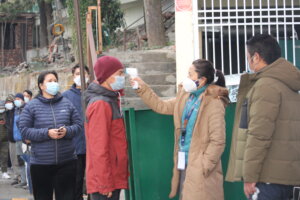
The Tibetan parliament consists of 45 members: ten members each from U-Tsang, Do-tod and Do-med, the three traditional provinces of Tibet, two members each from the four schools of Tibetan Buddhism and the traditional Bon faith, two members each from Europe and North America and a member representing Tibetans in Asia and Australasia (excluding India, Nepal and Bhutan).
The final elections will be held on 11 April 2021.




